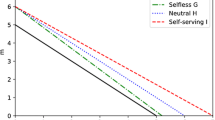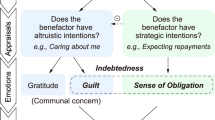Abstract
Past research on gratitude assumes that norms of reciprocity are incompatible with personal relationships as they are based on the rigid normative expectations characteristic of market-based exchange. Challenging this assumption, the present investigation demonstrates the importance of recognizing that norms of reciprocity take a less rigid and more tacit form in the case of personal relationships. Using a vignette-based experiment, Study 1 (N = 200) demonstrated that when expectations to reciprocate are framed in ways that reflect their normative character rather than are portrayed as based on self-interested individual expectations, this is associated with greater likelihood of helping, enhanced gratitude, and more positive personality impressions. In an online game, Study 2 (N = 108) showed that players reciprocate less money to their exchange partner in the presence as compared with the absence of self-interested individual expectations for return. Assessing real life helping among friends, Study 3 (N = 128) revealed that indebtedness is predictive of helping and that indebtedness and gratitude promote relationship closeness in contrasting ways.

Similar content being viewed by others
Notes
We use the term ‘personal relationships’ to reference friends, romantic partners, and family members.
By ‘everyday social support contexts’, we refer to the provision of help that occurs among friends, romantic partners and family members.
As we had not made predictions at the level of the individual personality traits, our analysis here is based solely on visual inspection of trends rather than on quantitative analysis.
References
Algoe, S. B. (2012). Find, remind, and bind: The functions of gratitude in everyday relationships. Social and Personality Psychology Compass, 6, 455–469. doi: https://doi.org/10.1111/j.1751-9004.2012.00439.x
Algoe, S. B., Haidt, J., & Gable, S. L. (2008). Beyond reciprocity: Gratitude and relationships in everyday life. Emotion, 8, 425. doi: https://doi.org/10.1037/1528-3542.8.3.425
Antonucci, T. C., & Jackson, J. S. (1990). The role of reciprocity in social support. In B. R. Sarason, I. G. Sarason, & G. R. Pierce (Eds.), Wiley series on personality processes. Social support: An interactional view (pp. 173–198). Oxford, England: John Wiley & Sons
Baker, W. E., & Bulkley, N. (2014). Paying it forward vs. rewarding reputation: Mechanisms of generalized reciprocity. Organization Science, 25, 1493–1510. https://doi.org/10.1287/orsc.2014.0920
Bartlett, M. Y., & DeSteno, D. (2006). Gratitude and prosocial behavior: Helping when it costs you. Psychological Science, 17, 319–325. Doi:https://doi.org/10.1111/j.1467-9280.2006.01705.x
Bartlett, M. Y., Condon, P., Cruz, J., Baumann, J., & DeSteno, D. (2012). Gratitude: Prompting behaviours that build relationships. Cognition & Emotion, 26, 2–13. doi:https://doi.org/10.1080/02699931.2011.561297
Fredrickson, B. L. (2004). Gratitude, like other positive emotions, broadens and builds. In R. A. Emmons, & M. E. McCullough (Eds.), The psychology of gratitude (pp. 145–166). Oxford: Oxford University Press
Goei, R., & Boster, F. J. (2005). The roles of obligation and gratitude in explaining the effect of favors on compliance. Communication Monographs, 72, 284–300. doi:https://doi.org/10.1080/03637750500206524
Goei, R., Lindsey, L. L., Boster, F. J., Skalski, P. D., & Bowman, J. M. (2003). The mediating roles of liking and obligation on the relationship between favors and compliance. Communication Research, 30, 178–197. doi:https://doi.org/10.1177/0093650202250877
Groger, L. (1992). Tied to each other through ties to the land: Informal support of black elders in a Southern U.S. Community. Journal of Cross-Cultural Gerontology, 7, 205–220. doi:https://doi.org/10.1007/bf00122509
MacKenzie, M. J., Vohs, K. D., & Baumeister, R. F. (2014). You didn’t have to do that: Belief in free will promotes gratitude. Personality and Social Psychology Bulletin, 40(11), 1423–1434. https://doi.org/10.1177/0146167214549322
Markus, H. R., & Kitayama, S. (1994). A collective fear of the collective: Implications for selves and theories of selves. Personality and Social Psychology Bulletin, 20, 568–579. doi: https://doi.org/10.1177/0146167294205013
Miller, J. G., Bland, C., Källberg-Shroff, M., Tseng, C., Montes-George, J., Ryan, K. … Chakravarthy, S. (2014). Culture and the role of exchange vs. communal norms in friendship. Journal of Experimental Social Psychology, 53, 79–93. doi:https://doi.org/10.1016/j.jesp.2014.02.006
Miller, J. G., Das, R., & Chakravarthy, S. (2011). Culture and the role of choice in agency. Journal of Personality and Social Psychology, 101, 46–61. doi:https://doi.org/10.1037/a0023330
Molm, L. D. (2010). The structure of reciprocity. Social Psychology Quarterly, 73, 119–131. doi:https://doi.org/10.1177/0190272510369079
Molm, L. D., Takahashi, N., & Peterson, G. (2000). Risk and trust in social exchange: An experimental test of a classical proposition. American Journal of Sociology, 105, 1396–1427. doi:https://doi.org/10.1086/210434
Molm, L. D., Whitham, M. M., & Melamed, D. (2012). Forms of exchange and integrative bonds: Effects of history and embeddedness. American Sociological Review, 77(1), 141–165. https://doi.org/10.1177/0003122411434610
Oishi, S., Koo, M., Lim, N., & Suh, E. M. (2019). When gratitude evokes indebtedness. Applied Psychology: Health and Well-Being, 11(2), 286–303. https://doi.org/10.1111/aphw.12155
Peng, C., Nelissen, R. M., & Zeelenberg, M. (2018). Reconsidering the roles of gratitude and indebtedness in social exchange. Cognition and Emotion, 32, 760–772. doi:https://doi.org/10.1080/02699931.2017.1353484
Ryan, R. M., & Deci, E. L. (2017). Self-determination theory: Basic psychological needs in motivation, development, and wellness. New York: Guilford Press
Schwartz, B. (1967). The social psychology of the gift. American Journal of Sociology, 73, 1–11. doi:https://doi.org/10.1086/224432
Tsang, J. (2006). The effects of helper intention on gratitude and indebtedness. Motivation and Emotion, 30, 198–204. doi:https://doi.org/10.1007/s11031-006-9031-z
Tsang, J. A. (2007). Gratitude for small and large favors: A behavioral test. The Journal of Positive Psychology, 2(3), 157–167. https://doi.org/10.1080/17439760701229019
Tsang, J. A., & Martin, S. R. (2019). Four experiments on the relational dynamics and prosocial consequences of gratitude. The Journal of Positive Psychology, 14(2), 188–205. https://doi.org/10.1080/17439760.2017.1388435
Uehara, E. S. (1995). Reciprocity reconsidered: Gouldner’s ‘moral norm of reciprocity’ and social support. Journal of Social and Personal Relationships, 12, 483–502. doi:https://doi.org/10.1177/0265407595124001
Visser, M. (2008). The gift of thanks. Toronto: Harper Collins
Watkins, P., Scheer, J., Ovnicek, M., & Kolts, R. (2006). The debt of gratitude: Dissociating gratitude and indebtedness. Cognition & Emotion, 20, 217–241. doi:https://doi.org/10.1080/02699930500172291
Author information
Authors and Affiliations
Corresponding author
Ethics declarations
Note
Neither authors have any interests that might be interpreted as influencing the research, and APA ethical standards were followed in the conduct of the study. We would like to acknowledge William Hirst for his feedback on a prior draft of this manuscript. All data that support the findings of this study are available from the corresponding author upon reasonable request.
Note
The authors do not have any interests that might be interpreted as influencing the research, and APA ethical standards were followed in the conduct of the study. All data that support the findings of this study are available from the corresponding author upon reasonable request.
Additional information
Publisher’s note
Springer Nature remains neutral with regard to jurisdictional claims in published maps and institutional affiliations.
Rights and permissions
About this article
Cite this article
Adams, M.M., Miller, J.G. The flexible nature of everyday reciprocity: reciprocity, helping, and relationship closeness. Motiv Emot 46, 461–475 (2022). https://doi.org/10.1007/s11031-022-09949-y
Received:
Revised:
Accepted:
Published:
Issue Date:
DOI: https://doi.org/10.1007/s11031-022-09949-y




